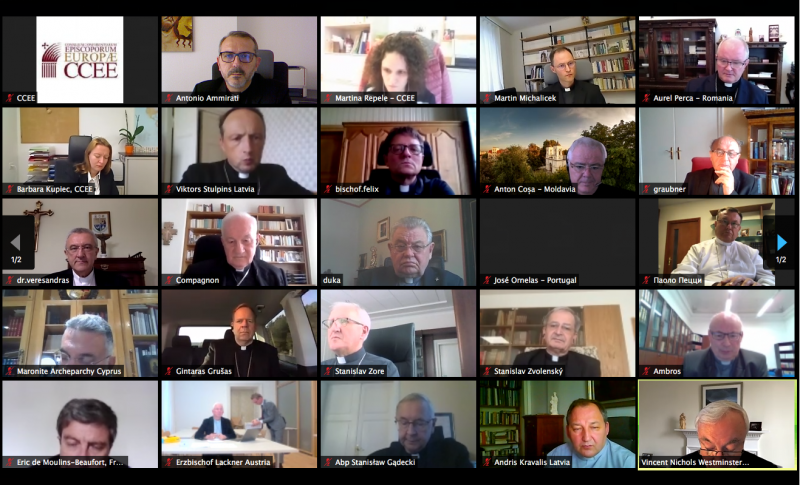The CCEE Plenary Assembly opened this afternoon with the reading of the message that was sent from Pope Francis to the Presidents of the European Bishops’ Conferences.
“The experience of this pandemic – wrote the Holy Father – has left a deep mark in all of us, because it dramatically affected one of the structural requirements of our existence – relations among people and in society – thus upsetting customs and relationships, and changing the conditions of our social and economic life”.
“The very life of the Church – continued Pope Francis – has been significantly impacted; we were forced to refashion our religious practice, and many pastoral activities have not adjusted to this new situation yet”. And he added: “Christian communities are called to engage in a spiritual interpretation of what we have experienced, so they can learn what life can teach and discern perspectives for the future”.
35 presidents from the European Bishops’ Conferences connected via videoconference to participate in the work and to reflect on “The Church in Europe after the Pandemic. Perspectives for Creation and the Community”. At the centre of the work therefore, is the pandemic and the changes and repercussions it is causing, but also a it is reflection on its religious, pastoral and ecological consequences, starting from the analysis that each President will make of the situation within his own Bishop’s Conference.
In his greeting to the participants, Cardinal Marc Ouellet, Prefect of the Congregation for Bishops, encouraged them: “As masters of the faith leading millions of believers in Europe, we are aware of the challenge to bear witness to the Hope that dwells within us and urges us to seek the appropriate way, following the example of Pope Francis, to console, encourage, motivate and support all efforts to “move forward together without leaving anyone behind”.
On the subject of “Eucharistic fasting has made us lose the habit of Sunday Mass”, the prefect of the bishops also strongly urged “a new evangelization is urgently needed to make Christians discover that the Eucharist is not only a spiritual nourishment for our journey, but our joyful witness to the encounter with the Risen One, who gives us the Spirit of life and courage in difficult times”.
Introducing the work, Cardinal Angelo Bagnasco, CCEE President, explained that the growing emergency suggested to “focus our efforts on the phenomenon that has hit the whole world, in order to be able to understand it better, to identify ways of ecclesial collaboration that might be of help and encouragement to the whole of society, and to offer a sign of communion and hope for the entire continent”.
And he added: “our praying thoughts go out to the many victims of the epidemic, to those who have experienced their final passing without the presence of their loved ones. We express our appreciation to the countless people – doctors, nurses, law enforcement authorities, providers of basic services, volunteers, priests, and men and women religious – who have made us feel through prayer, speech, looks, and gestures that a truly human society does not abandon anyone, and that caring for people calls for appropriate therapies, but cannot do without love and human and religious warmth. Our thoughts extend even further: we would like our communities, our peoples, our States, and Europe, to feel that we are neighbours, pastors, and friends. But, let us say this: at this moment, our heart would like to reach out to the whole world, and to approach humankind – like the Samaritan woman of the Gospel – marked by the invisible scourge, thirsting for the living water that is Jesus. For all of us we will keep on praying and bring every possible sign of Christ’s grace. Together with every righteous person of good will, we hope that the social and religious life, as well as the labour market and the economy, and nations, will get back to being truer, wiser, and more powerful”.
“we begin to work – continued the President of the European Bishops – to discern how Christ, “light of all people”, can shine ever more brightly on the face of the Church, being aware that the Gospel has generated civilization, culture, and beauty for two thousand years now. That in the Incarnate Word the face of God-Love and, consequently, the face of human dignity is fully manifested. We believe – as Pope Francis says – in a Europe that is a family in solidarity, subsidiarity, and respect for different peoples, knowing that the Gospel keeps on being an inexhaustible contribution to build an earthly Civitas that is not withdrawn and imploding, but open beyond itself, with its feet on earth and its gaze in Heaven”.
A European dream, the one indicated by Cardinal Bagnasco, which sees Europe not “not primarily an organisation, but – we could say – a living “entelechy”, i.e. a working spirit, a purpose not superimposed but intrinsic to its own reality. The Gospel marks not only its coming to light, but its very conception; it is the principle that specifies and unifies, that enhances and summarises every genuine contribution. This origin carries with it the seal of universality, which can never be predominance but service to the people”, praying with the words of St. Augustine “that every human being will find that God, from whom to turn is to fall, to whom to turn is to rise, in whom to abide is to stand, unto whom to return is to revive, to whom to dwell is to live.

